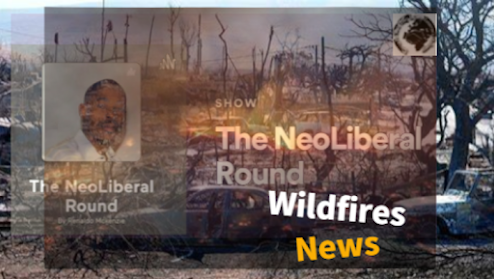National Fire News: Preparedness Levels Increased to 4, How Much damage do Wildfires Cause?
On the latest episode of The NeoLiberal Round Podcast: The National Multi-Agency Coordinating Group raised the National Preparedness Level to Level 4 due to significant wildland fire activity in multiple Geographic Areas, signaling the potential for more large wildfires. Over 20 Incident Management Teams are actively handling wildfires across various geographic zones. The National Interagency Coordination Center is collaborating closely with Geographic Area Coordination Centers to organize and fulfill orders for firefighting resources.
Presently, over 10,600 wildland firefighters and support personnel are assigned nationwide. Eleven new large fires were reported recently, with six in California, and one each in Arizona, Florida, Hawaii, Montana, and Washington. These incidents collectively led to the burning of 515,705 acres across 14 states.
In response to the situation, a Type 1 incident management team is being deployed to Hawaii to aid wildfire suppression efforts. The Federal Emergency Management Agency (FEMA) maintains its close partnership with local and state agencies in Maui.
For additional information, you can refer to the following sources:
- County of Maui Disaster Update
- Hawaii Emergency Management Agency emergency proclamation relating to wildfires and travel to Maui
- FEMA - Hawaii wildfires
How Much Damage Do Wildfires Cause? (Commenting on the Story by Florian Zandt in Statista.com)
The article discusses the significant impact of natural catastrophes linked to elevated temperatures, such as wildfires and droughts, on the United States in 2022. These events resulted in $18 billion in losses, with only half of this amount being covered by insurance. Management consulting and reinsurance providers Aon and Munich Re provided these estimates. A natural catastrophe is defined by Aon as an incident leading to property losses exceeding $25 million, ten or more deaths, 50 or more injuries, 2,000 or more filed claims, or extensive damage to homes and structures.
The article's accompanying chart reveals a decline in estimated losses since their peak in 2018. Munich Re calculated losses of approximately $25 billion in the U.S. for this year. Notably, the Mendocino Complex Fire, one of California's largest wildfires, contributed around $56 million to insured losses. This fire scorched 459,000 acres and raged from late July 2022 to early January 2019.
Despite these losses, the article points out that the catastrophic events of 2022 were overshadowed by the 2020 wildfire season in the Western United States. This particularly destructive season saw 47 fatalities, the burning of 10.2 million acres, and the destruction of over 13,000 structures across more than 100 fires within four months.
The National Oceanic and Atmospheric Administration underscores that climate change is a primary driver of increased global wildfire activity. Rising emissions and global warming contribute to higher temperatures and prolonged drought, creating favorable conditions for the ignition and spread of wildfires, especially in arid regions. These fires lead to devastating consequences including structural damage, loss of life, and severe injuries. Additionally, wildfires contribute to the loss of global tree cover. In 2022, a total of 56 million acres of tree cover were lost, with wildfires responsible for 16.6 million acres of this loss, according to estimates by Global Forest Watch.
This story is sponsored by Statista.com.
The NeoLiberal Round is a production by Renaldo McKenzie of The NeoLiberal Corporation, serving the world today to solve tomorrow's challenges by making popular what was the monopoly. Visit https://thneoliberal.com or https://renaldocmckenzie.com. Peruse our resources center and check out our books, support services - website, content, academic, publishing, and podcast support.
Announcement: NeoLiberal Globalization Reconsidered will be released later this month.
Follow on Twitter: https://twitter.com/renaldomckenzie.
Support us: https://anchor.fm/theneoliberal/support
The Podcast is also available via Google Podcast.


Comments
Post a Comment